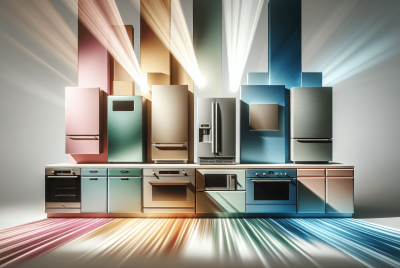Can Smart Kitchen Devices Help Reduce Food Waste
Imagine a world where your kitchen appliances work together seamlessly to help you reduce food waste. Picture a refrigerator that reminds you to use up ingredients before they expire, a smart oven that suggests recipes based on the items you have on hand, and a futuristic pantry that tracks your food inventory in real time. These smart kitchen devices have the potential to revolutionize the way we approach food storage and preparation, ultimately leading to a significant reduction in food waste. In this article, we will explore how these intelligent appliances can help us make more informed decisions in the kitchen, save money, and contribute to a more sustainable future. So, grab a cup of coffee and let’s discover how these smart kitchen devices can empower us to reduce food waste.

This image is property of images.pexels.com.
Understanding Food Waste
Food waste is a widespread issue that continues to plague societies across the globe. But before delving into the implications and potential solutions, it’s essential to define what exactly food waste entails. Food waste refers to the loss or disposal of edible food at any stage of the supply chain, from production and processing to distribution and consumption. This includes both food that is discarded and never consumed, as well as food that is thrown away after it has been cooked or served.
Statistics and Facts about Food Waste Globally
The scale of food waste is staggering, with approximately one-third of all food produced for human consumption ending up being wasted globally. This amounts to a shocking 1.3 billion tonnes of food wasted each year. These statistics reveal the gravity of the issue and emphasize the urgent need for effective solutions. Food waste not only contributes to hunger and malnutrition but also has severe environmental, economic, and social implications.
Environmental, Economic, and Social Implications of Food Waste
Food waste has significant environmental consequences. When food is wasted, all the resources that went into producing it, such as water, land, and energy, are also wasted. This leads to unnecessary greenhouse gas emissions, contributing to climate change. Furthermore, food waste in landfills produces methane, a potent greenhouse gas that is even more harmful than carbon dioxide.
From an economic standpoint, food waste is a tremendous loss of resources. The cost of producing, transporting, and storing food is substantial, and when it goes to waste, all the associated costs are essentially wasted as well. Food waste also affects food security, as resources that could have been used to feed the hungry are instead squandered.
On a social level, food waste exacerbates food inequality and hunger. If food that is currently being wasted were properly distributed, it could go a long way in alleviating hunger and malnutrition worldwide. Additionally, the act of wasting food displays a lack of appreciation and disrespect for the efforts of those involved in its production.
Examining the Role of Modern Kitchen
The kitchen is where much of our food waste occurs, making it an important focal point when addressing the issue. The interplay between the kitchen space and food waste reveals several factors that contribute to the problem.
Interplay between the Kitchen Space and Food Waste
Modern kitchens have evolved to be more than just a place for food preparation. They have become multifunctional spaces where meals are cooked, eaten, and often socialized over. However, this increased functionality can also lead to a higher potential for food waste. The layout, organization, and design of a kitchen can influence how efficiently it is used, affecting the likelihood of food waste.
Modern Kitchen Practices Contributing to Food Waste
Several modern kitchen practices inadvertently contribute to food waste. For instance, the prevalence of bulk buying and large refrigerators can lead to a sense of abundance that encourages overbuying, resulting in food not being consumed before it spoils. Similarly, the convenience of takeout and ready-to-eat meals means that people may be more likely to order more food than they can finish, leading to waste.
Another factor is the lack of awareness and knowledge about proper food storage and preservation techniques. Many people are unaware of the optimal conditions required to keep different types of food fresh, which can result in premature spoilage and waste.
Exploring the Potential of Modern Kitchens in Reducing Food Waste
Despite these modern kitchen practices that contribute to food waste, modern kitchens also hold immense potential in addressing the issue. By incorporating smart kitchen devices and adopting sustainable habits, individuals can significantly reduce food waste.

This image is property of images.pexels.com.
Introduction to Smart Kitchen Devices
Smart kitchen devices, also known as smart appliances, are technologically advanced tools designed to enhance efficiency and convenience in the kitchen. These devices employ digital technology and connectivity to optimize various functions, including food storage, cooking, and meal planning.
Understanding What Constitutes Smart Kitchen Devices
Smart kitchen devices encompass a wide range of appliances that utilize sensors, wireless connectivity, and artificial intelligence to offer advanced features. These devices are empowered to analyze data, make informed decisions, and provide users with useful insights and recommendations to reduce food waste.
Various Types of Smart Kitchen Devices
The market for smart kitchen devices is continually expanding, offering a variety of options for consumers. Some popular examples of smart kitchen devices include smart refrigerators, smart cooking devices, and smart food storage technologies. Each type of appliance addresses different aspects of food waste reduction, and their collective integration holds promise for a more sustainable kitchen ecosystem.
How Smart Kitchen Devices Function
Smart kitchen devices are equipped with advanced technologies that enable them to perform a range of functions. Most devices utilize sensors to collect data, such as temperature, humidity, and weight, which are then analyzed by integrated software. This software can provide real-time information, send alerts, and even automate processes to optimize food storage, cooking, and meal planning.
Next Page: Smart Refrigerators and Food Waste.

This image is property of images.pexels.com.




